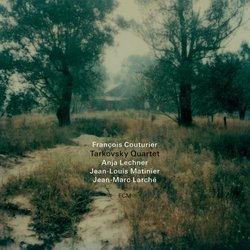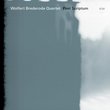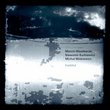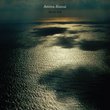| All Artists: François Couturier, Anja Lechner, Jean-Marc Larche, Jean-Louis Matinier Title: Tarkovsky Quartet Members Wishing: 2 Total Copies: 0 Label: ECM Release Date: 7/26/2011 Genres: Jazz, Classical Styles: Historical Periods, Classical (c.1770-1830) Number of Discs: 1 SwapaCD Credits: 1 UPC: 602527425269 |
Search - François Couturier, Anja Lechner, Jean-Marc Larche :: Tarkovsky Quartet
 | François Couturier, Anja Lechner, Jean-Marc Larche Tarkovsky Quartet Genres: Jazz, Classical
Following on from Nostalghia - Song for Tarkovsky (2005) and the solo piano album Un jour si blanc (2009), this new recording, made in the responsive acoustic of the Auditorium RSI in Lugano, completes a trilogy for Fran&#... more » |
Larger Image |
CD Details
Synopsis
Product Description
Following on from Nostalghia - Song for Tarkovsky (2005) and the solo piano album Un jour si blanc (2009), this new recording, made in the responsive acoustic of the Auditorium RSI in Lugano, completes a trilogy for François Couturier and also opens a new door for his quartet, known henceforth as the Tarkovsky Quartet. The work of filmmaker Andrei Tarkovksy (1932-1986) continues to provide inspiration for the pianist, and his compositions here are packed with allusions to Tarkovsy's life and art. In a liner note, Charles de Brantes illuminates some of these references, pointing out that the titles of the twelve pieces heard here themselves constitute a series of tributes. "A celui qui a vu la'ange", for instance, is an epitaph inscribed on Tarkovsky's tombstone. "Tiapa" and "Maroussia" were Tarkovsky's affectionate nicknames for his youngest son and his mother. "Myshkin" is named for the Dostoyevskyan prince whom Tarkovsky often spoke of as an apt film subject. "San Galano" is the ruined abbey in Nostalghia. "Mouchette" was Tarkovsky's favorite Bresson film, and "Doktor Faustus" the Thomas Mann novel that he longed make into a movie. Tarkovsky wrote the screenplay for the Tajik Western Sardor, but never filmed it. "La passion selon Andrei" was the original title of Tarkovsky's historical masterpiece. "L'Apocalypse", last book of the Bible (Revelation), is a frequent reference in Tarkovky's last three films, "La main et le oiseau" (The hand and the bird) "feature in the brief scene in The Mirror which Tarkovsky later referred to as his self-portrait. This leads, finally to "De l'autre côté du miroir", the other side of the mirror: through the looking glass toward other destinations for the imagination. "San Galagno", "Sardor" and "Le main et l'oiseau" are collective improvisations by Couturier, Lechner, Larché and Matinier, their musical depth testimony to the way in which the group has developed in the last five years. All other pieces are composed by Couturier, who points out that "A celui qui a vu l'ange" is inspired by "Qui est homo" from Pergolesi's "Stabat mater" and "Maroussia" by Johann Sebastian Bach's "Das alte Jahr vergangen ist". "La passion selon Andreï" references "Herr, unser Herrscher" from Bach's "Johannespassion", and "Doktor Faustus" makes allusions to Shostakovich's Sonata for violoncello and piano, op. 40.
Similar CDs
| Wolfert Brederode Quartet Post Scriptum Genres: Jazz, Pop Label: ECM | |
| Marcin Wasilewski Trio, Marcin Wasilewski, Slawomir Kurkiewicz Faithful Genres: Jazz, Pop Label: ECM Records | |
| Amina Alaoui Arco Iris Genres: Jazz, Pop Label: ECM Records | |

 Track Listings (12) - Disc #1
Track Listings (12) - Disc #1

